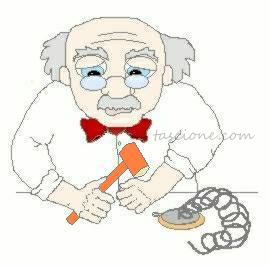[ShowSalesProof ID=1][/ShowSalesProof]

Today we will address the second question on the list:
-
When will I know it’s safe to begin repairing for others?
As I mentioned in yesterdays report, most clock and watchmakers that have been repairing for many years still learn something new every day. Somewhere along their learning curve they had decided when it was time to repair the first timepiece for profit. This first timepiece was usually of a brand or style with which they became quite familiar through repeated application of the most common general repair techniques. Feeling comfortable and confident enough, they would eventually accept for repair a somewhat similar timepiece.
Most successful clock and watchmakers that I know in the business started out slowly, taking in one timepiece at a time. After completion of that timepiece another could be accepted for repair.
As with any repair business you must be careful and determine for yourself if you feel qualified enough to start repairing for other people. When in doubt about your ability to repair a particular timepiece or if the required repair is beyond your level expertize then by all means be honest with your customer about your concern. If you don’t feel that you should tackle a particular timepiece due to lack of experience then do tell them. They will respect your honesty. Not many watch and clock makers can do everything that comes there way. We all have to depend on people in this field that specialize in a particular aspect of repair that may be beyond or abilities.
One of the biggest mistakes beginners make is getting in over their heads from the onset. Because the demand for clock and watch makers is high in some areas the beginner may find that getting work is fairly easy. The problem is that it’s sometimes too easy. Just about everyone you run into has an old (or new) clock or watch that they need serviced.
in some areas the beginner may find that getting work is fairly easy. The problem is that it’s sometimes too easy. Just about everyone you run into has an old (or new) clock or watch that they need serviced.
Test what I’m saying here by mentioning that you’re
going to be repairing clocks and watches to a friend,
acquaintance, owner of a jewelry or antique store, whomever you like and watch what happens. They will likely mention a watch or clock that they’ve had for years that they want to give you to repair.
If you start accepting work from everyone that approaches you you’re probably going to back yourself into a high pressure corner. You may understand how to do many of the most common repairs that come your way but you probably won’t be productive enough at first to keep yourself from getting overwhelmed with work.
Although a book, video or course will teach you many of the basic techniques
and repairs to get you started much of what you will learn when repairing timepieces will come from experience. So be very careful when starting out not to take any job in without first having had enough practice on a similar watch or clock. Know that you have achieved that necessary level of proficiency. When asked to repair a timepiece you’ll know you’ve reached that level when you have no doubt as to whether or not you can handle the job.
 As with any trade there are some things you may be good at and some things that you may not feel comfortable with. Unless you know someone in the business who is willing to help and has the time to check your progress as you go only you alone can and must determine your level of readiness to enter into the service end of this trade. Know your weak and strong points and come to terms with both by understanding that no one can do everything but there will undoubtedly be some things that you can do well and some things that may not be something you should attempt until you feel more confident about it.
As with any trade there are some things you may be good at and some things that you may not feel comfortable with. Unless you know someone in the business who is willing to help and has the time to check your progress as you go only you alone can and must determine your level of readiness to enter into the service end of this trade. Know your weak and strong points and come to terms with both by understanding that no one can do everything but there will undoubtedly be some things that you can do well and some things that may not be something you should attempt until you feel more confident about it.
It takes time to get fast at repair work and it takes experience to estimate the time it will take to complete a particular job. So in the beginning it’s best not to build a backlog of work when it’s not yet possible to determine and give a customer or yourself an accurate estimate of when the job will be ready to pickup. It’s also possible that without having this restraint in place one may end up with a huge backlog of work where far too low price estimates were given.This in itself can take out an otherwise promising business.
Accurately estimating work costs is a crucial part of any service business and is an area with lots of traps which can all be avoided if approached correctly. We’ll cover this important subject in a future report.
A common mistake that beginners often make in this business is charging too little for their work. This is a big mistake and again it’s usually due to lack of experience.
I just pointed out above that it takes time and practice to get your speed up and to create a system that will work well for you. Two essential components of this system are knowing how much time a particular type of job usually takes to complete and having a clear understanding of what your time is worth to you. Both of these topics will be addressed in a future report.
If it sounds like I’m trying to discourage you I’m really not. I just want to see that you’re successful and I know that taking your time and letting your business “evolve” is actually the fastest way to succeed. By evolve I mean letting the business build itself.
If you are already a Course Member then do try to spend some time up on the course Members Forum. There are many active forum members making their livings repairing clocks and watches and you can pick up a lot of great business tips and ideas from them. They are a great, helpful group, always willing to help anyone with questions so don’t be shy and ask away!
In the next report I’ll attempt to address the third question on the list about how and where to find customers.
‘Til then, adios for now
Bob
Disclaimer:
I CANNOT GUARANTEE YOUR FUTURE RESULTS AND/OR SUCCESS. THERE
ARE SOME UNKNOWN RISKS IN BUSINESS THAT I CANNOT FORESEE WHICH
CAN REDUCE RESULTS. I AM NOT RESPONSIBLE FOR YOUR ACTIONS OR
YOUR RESULTS. AS WITH ANY BUSINESS SOME ARE SUCCESSFUL AND SOME
ARE NOT. PLEASE BE CAREFUL AND RESEARCH AS MUCH AS POSSIBLE
BEFORE ENTERING INTO ANY SERVICE BUSINESS.
